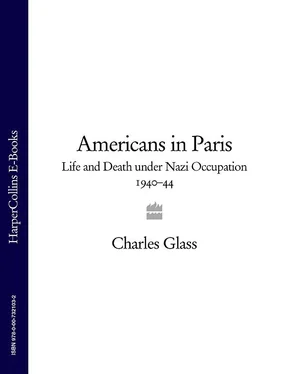When the French government left Paris on 10 June, Bullitt telegraphed Secretary of State Cordell Hull: ‘This Embassy is the only official organization still functioning in the City of Paris except the Headquarters of the military forces, Governor and the Prefecture of Police.’ Italy, seeing that Germany would win, declared war on France and launched an invasion from the south that the outnumbered French repulsed. A few hours later, at the University of Virginia, Roosevelt declared, ‘On this tenth day of June 1940, the hand that held the dagger struck it into the back of its neighbor.’ He had borrowed the phrase from Bullitt. Gallup published its latest poll the same day: 62 per cent of the American people believed that, if Germany defeated both France and Britain, it would attack America next. The following day, Bullitt cabled Roosevelt: ‘I have talked with the Provisional Governor of Paris, who is the single government official remaining, and it may be that at a given moment I, as the only representative of the Diplomatic Corps remaining in Paris, will be obliged in the interest of public safety to take control of the City pending arrival of the German Army … Reynaud and Mandel just before their departure requested me to do this, if necessary.’
On 12 June, the day that Prime Minister Reynaud and Interior Minister Georges Mandel made him in effect Paris’s provisional mayor, Bullitt attended a prayer service at the Cathedral of Notre Dame. Kneeling in the front pew, he was seen to weep for the city and country he loved.
Secretary of State Hull urged Bullitt to follow the French government to Tours and persuade the French to fight on from their bases in Morocco, Algeria and Tunisia. Bullitt argued that, in the absence of FDR’s commitment of American arms, the French would ignore him. He cabled Hull after the service in Notre Dame, ‘As I said to you when you telephoned me the night of Sunday the 9th my deepest personal reason for staying in Paris is that whatever I have as a character, good or bad, is based on the fact that since the age of four I have never run away from anything however painful or dangerous when I thought it was my duty to take a stand. If I should leave Paris now I would no longer be myself.’ Bullitt was saving Paris. Hull was asking him to save France.
A few hours later, Bullitt wrote a follow-up telegram to Hull: ‘I propose to send my Military Attaché and my Naval Attaché to the German General Commanding the forces in the Paris area to explain the situation and return with suggestions of the German command as to methods of facilitating the orderly transition of government.’ German forces agreed to enter the city peacefully the next morning, but someone fired on German truce officers near the Porte Saint-Denis in the north of Paris. General Georg von Küchler, the German 10th Army commander who had demolished Rotterdam only a few weeks earlier, responded by ordering an all-out air and artillery assault on Paris. It was scheduled for eight o’clock in the morning, leaving Bullitt only hours to save the city from destruction. His communications, like everyone else’s, had been sporadic since the French Army cut Paris’s telegraph lines as it withdrew on 11 June. A chance telephone call from the American Embassy in Berne, Switzerland, opened a line for Bullitt to relay a message to Berlin. He urgently requested the Germans to recognize that ‘Paris has been declared an open city’. He proposed a parley early the next morning, 14 June, to save lives on both sides and prevent the destruction of Paris. Bullitt wanted to spare Paris the fate of Warsaw the year before, when the Luftwaffe demolished much of the Polish capital and killed 17,000 people.
General von Küchler agreed to try again before bombing the city. However, the French commander of the Paris region, 48-year-old General Henri-Fernand Dentz, refused a German demand to negotiate the transfer of power. His orders, he told the Germans via a radio link through the Prefecture of Police, were to provide security. He was not authorized to hold discussions with the enemy. At 2.25 in the morning, the Germans radioed Dentz: ‘Delegates till 5 a.m. German time on the fourteenth at Sarcelles. Comply – otherwise attack ordered on Paris.’ (German time was Greenwich Mean Time plus two hours, an hour later than in Paris.) Dentz acquiesced, sending two officers, Major Devouges and Lieutenant Holtzer, to treat with the Germans at Écouen, 12 miles north of Paris. At 5.30 a.m., Paris time, the two sides settled terms for the handover. The French achieved one amendment to the document: withdrawal of a forty-eight-hour non-stop curfew on the grounds that it contradicted the German requirement for public services like water and electricity to function normally. German Major Brink compromised by limiting the curfew from 9 p.m. to dawn. With the document signed, von Küchler cancelled the bombardment of Paris. Bullitt’s intervention had spared the City of Light.
Some Germans did not wait for the official capitulation. At 3.40 in the morning, a German soldier on motorcycle sped through the 11th Arrondissement, between the Place de la Nation and the Place de la République. More troops penetrated the city in trucks and armoured cars, followed by large units marching in formation, all spit and polish to impress the Parisians. The first American resident of Paris to see them was most likely Charles Anderson, who lived in Montmartre and rose before sunrise each day to take the Metro train to work. Born in Lebanon, Illinois, in 1861, Anderson ran away from home to join the Barnum Circus when he was 15. He enlisted in the American Army as it was completing the annihilation of the Indian tribes. In 1884, he worked his way by merchant ship from Boston to Europe. When his seaman’s pay ran out in France, he volunteered for the French Foreign Legion. Military service took him to the North African desert and, during the Great War, to Paris. On leaving the Legion after the Armistice of November 1918, he became an interpreter at the International Transport Company of Maurice de Brosse. De Brosse, in the frantic days before the Germans arrived, urged Anderson and his French wife, Eugénie Delmar, to leave Paris and come south with him. Nazi racial policies could be harsh on a black American, especially one married to a white woman. Anderson answered, ‘No, I’ll stay. No need to run.’
M. de Brosse asked Anderson what he would do in German-occupied Paris. When Anderson answered that he would report to work every day as usual, de Brosse pleaded, ‘The office will be closed!’ Anderson, a patient man who taught chess to young people in the evenings, said, ‘That doesn’t matter. I’m too old now to change my ways.’ De Brosse left, and Anderson stayed. He was almost eighty years old. On the morning of 14 June, Anderson watched German troops occupy an apartment building opposite his seven-room flat in Montmartre. The soldiers were courteous to him, and he was polite in return. The occupation, he decided, would not change his life. And he went to work.
Ambassador Bullitt, fearing a communist revolt in the working class suburbs, had made it a condition of his appointment as acting mayor of Paris that the police and firemen remain at their posts. He had also requested that Washington ship Thompson sub-machine guns to protect the embassy, mainly from the communist uprising that he wrongly predicted. Diplomatic manuals did not dictate protocol for an American ambassador to turn over a foreign capital to a conquering army, so Bullitt improvised. General Bogislav von Studnitz, commander of Germany’s 87th Infantry Division who would soon be Provisional Military Governor of a city he had never visited, simplified Bullitt’s task by instructing his staff to requisition the Hôtel Crillon at 7.55 that morning. The Crillon was only a dozen yards from the embassy wall. Von Studnitz, noted one French writer, was the type of Prussian officer that generations of Frenchmen thought ‘were born with monocles fixed to their eyes’. One of his first acts on entering the city was to put Paris one hour ahead to Berlin time.
Читать дальше












